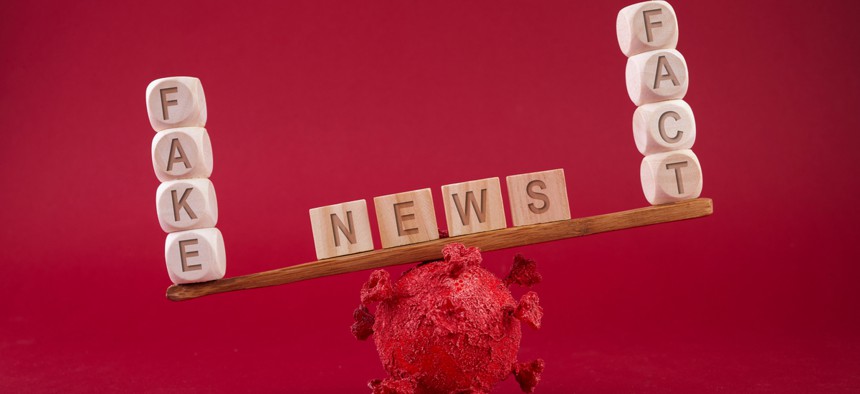Lawmakers Propose $1M to Examine How Mis- And Disinformation Impacted COVID-19 Response

vetre/Shutterstock
In particular, they’d like to know more about foreign and domestic sources propagating false information.
Democrats in both chambers on Thursday introduced legislation that would grant $1 million for a National Science Foundation-led probe into how online disinformation and misinformation disrupted the public response to the novel coronavirus.
The study that would be mandated by the COVID-19 Disinformation Research and Reporting Act—introduced by Rep. Jennifer Wexton, D-Va., and four Democratic co-sponsors in the House and Sen. Mazie Hirono, D-Hawaii, and five Democratic co-sponsors in the Senate—would also seek to uncover the foreign and domestic sources behind coronavirus-related inaccurate information.
"200,000 Americans have died as the coronavirus pandemic rages on,” Hirono said in a statement. “As we work to curb infections across the country, we also face an infodemic caused by the viral spread of false information on the internet—particularly on social media.”
Heaps of baseless conspiracy theories, myths and hoaxes have and continue to circulate across Facebook and other social media platforms—at what some deem unprecedented rates—since the pandemic’s emergence, leading hospitals, organizations and federal agencies to release statements and pursue efforts to try to limit their spread. While disinformation refers to details that are inherently manipulated or disseminated with an intentional aim to be deceptive, misinformation does not necessarily involve the intent to mislead. Doctors from across the U.S. have raised concerns that the escalation of both are causing many patients to resist fact-based medical insights for what they’ve read on the internet.
“False information, spread willfully or not, can be deadly in a public health crisis like this,” Wexton said, adding the bill would bring together the “brightest scientific minds to examine this threat and provide lawmakers with the objective analysis we need to confront it."
Specifically, the bill would direct NSF to team up with the National Academies of Sciences, Engineering, and Medicine to conduct a study on “the current understanding of the spread of COVID–19-related disinformation and misinformation on the internet and social media platforms.”
The legislation also calls for a look into how social media platforms contribute to the spread of unfounded content and their role in the organization of groups intending to spread it. Further, those conducting the study would be expected to look into appropriate mitigation strategies to stop the dissemination of untrue information on the web—and more.
Results of the study would be sent in a report to Congress no later than one year after the bill’s passage.
Wexton and Hirono will hold a virtual roundtable Tuesday to further discuss the legislation and broader challenge.






